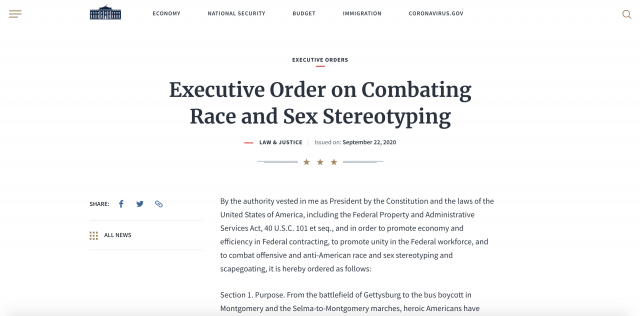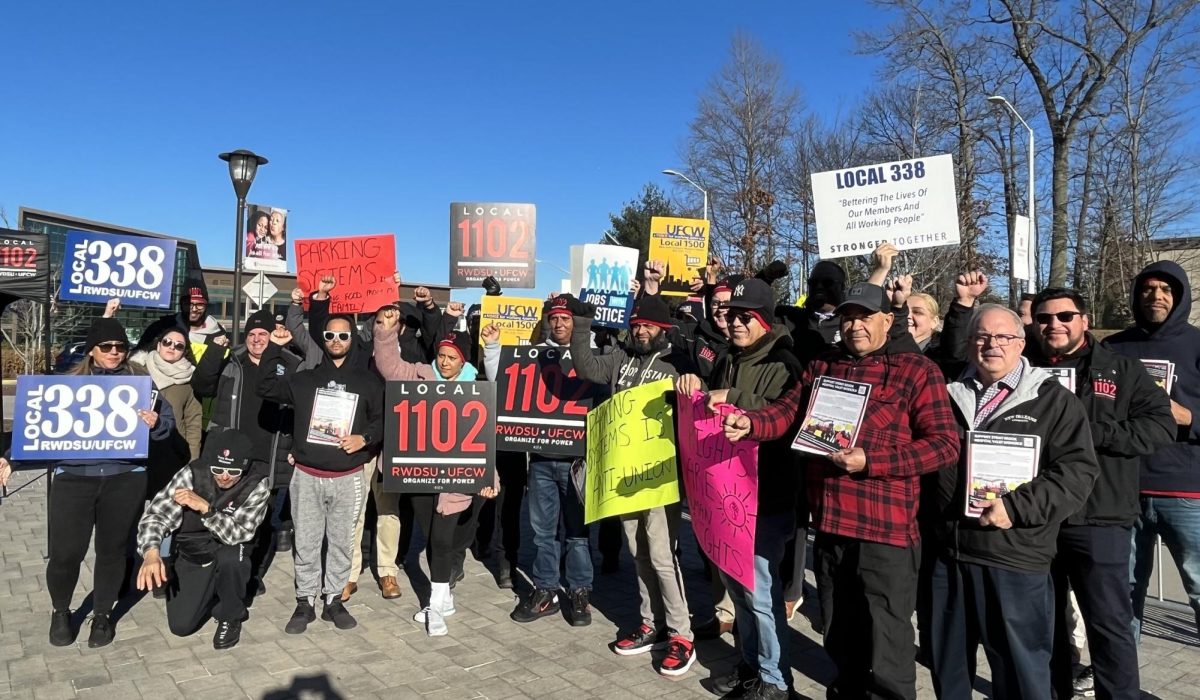
College campuses may have to halt some diversity efforts and employee training programs after the White House’s recent executive order against “divisive concepts” in federally funded programs.
The executive order, issued on Sept. 22 by President Donald Trump, prohibits federal agencies, companies with federal contracts and recipients of federal grants from participating in training that “promotes race or sex-stereotyping or scapegoating.”
“Many people are pushing a different vision of America that is grounded in hierarchies based on collective social and political identities rather than in the inherent and equal dignity of every person as an individual,” the order reads. “This ideology is rooted in the pernicious and false belief that America is an irredeemably racist and sexist country; that some people, simply on account of their race or sex, are oppressors; and that racial and sexual identities are more important than our common status as human beings and Americans.”
In the purposes of the order, prohibited training topics include “divisive concepts” in which one race or sex is inherently superior to another; the U.S. is fundamentally racist or sexist and a person should feel some form of psychological distress on account of their race or sex — among many others.
The Office of Management and Budget-issued memorandum on the order goes further to define key words and phrases to search for when examining if an agencies training curriculum is qualified as “divisive,” including “critical race theory,” “white privilege,” “intersectionality,” “systemic racism,” “positionality,” “racial humility” and “unconscious bias.” Some of these concepts are typically subjects of diversity and inclusion efforts and training.
Implicit bias, a synonym for unconscious bias, is explicitly mentioned as a part of employee training in Stony Brook University’s Plan for Equity, Inclusion and Diversity.
Stony Brook University’s operating budget is grounded in state funds, according to Judith Brown Clarke, vice president for equity & inclusion and chief diversity officer at Stony Brook University.
“While we do have some federal funded research grants, I am pleased to report that we have provided meaningful diversity and equity workshops and trainings that have not been deemed violations,” she said. The order could still curb future training, however, if diversity programs use any of the federal funds or grants the university receives.
For the fiscal year of 2021, Stony Brook University is seeking about $170 million from Congress for the National Endowment for the Humanities. Programs funded by this endowment stimulate creativity and innovation while developing cultural competencies critical to global leadership and successful diplomacy, according to the Fiscal Year 2021 Federal Funding Recommendations.
According to the memorandum, the university could not use these federal funds to conduct academic research “premised on divisive concepts” under the order.
The restrictions of the executive order conflict with messages of other executive orders, like one in March 2019 that was enacted to “encourage institutions to foster environments that promote open, intellectually engaging, and diverse debate.”
All future federal contracts will include terms barring use of the divisive concepts, and contractors will have to share that notice with collective bargaining groups, according to State University of New York (SUNY) issued guidelines for institutions regarding the new directive. If there are violations, contracts can be canceled and contractors can be suspended or debarred from future awards.
In terms of the current use of federal funds, the executive order says that within 90 days of Sept. 22, each agency has to report to the Office of Management and Budget all of its spending in the year of 2020 on employee training programs relating to diversity or inclusion. The SUNY guidelines advise universities to “take care in reviewing both current and future contracts and grants.”
Stony Brook officials said the goals of the executive order are in direct conflict with Stony Brook University’s diversity goals. In 2019, Respect Diversity and Foster Inclusiveness was added as a new Stony Brook curriculum requirement to “identify systematic barriers to equality and inclusiveness and discuss how those barriers and biases affect the perceptions of others” and “describe and analyze the impact of power and privilege on self and society in the context of diversity and inclusion.”
“Diversity and equity training and programs help us to achieve higher education’s overarching goal, which is to improve student learning and outcomes,” Clarke said. “Diverse representation and inclusive learning environments provide inspiration and aspiration that helps all students believe that they can excel and achieve thought leadership in the profession they choose.”
Stony Brook University has also supported a letter representing institutions included in the Association of American Universities, in addition to many other higher education associations, asking that the executive order from the Trump administration be withdrawn.
“It’s a sense of someone kind of covering up or not really being truthful or honest about how the system has placed certain people in disparate conditions — but all we talk about in America is land of the free and home of the brave,” Jarvis Watson, former interim chief diversity officer and current assistant dean of multicultural affairs, said regarding the order.
According to Clark, the order centers less on identity and other ideas that emphasize differences and instead focuses more on what makes people alike. Just last year, Stony Brook University’s theme for Black History Month was “Owning Your Own Narrative,” which emphasized individual identity.
“Not only should we not pull away from identity, we should embrace and empower self identifies as a strength to leverage and facilitate innovation and capacity,” Clarke said.
The order’s statement says that today people are pushing for a different vision of America and that it is rooted in the “pernicious and false belief that America is an irredeemably racist and sexist country.”
There have been centuries of oppression towards people of color and women in the United States.
Black Americans still face racial discrimination from law enforcement and disproportionate barriers to voting, including early voting restrictions, voter ID requirements and voter roll purges. Additionally, since 2010, 25 states have put into place new requirements such as voter ID laws, closing polling places and cutbacks to early voting, according to the Brennan Center for Justice.
“When you get faced with adversity, you realize why you’re doing what you’re doing and all the adversity we’ve been through as people of color in this country, helps us to define our actions and how we communicate and how we relate,” Watson said. “It helps us learn how to strategize, and how to include other people into this, because we’re tired of going through the same old stuff.”
The SUNY community has also issued a statement on the importance of diversity training that more than 1,300 people signed, including Chancellor Jim Malatras, SUNY’s Board of Trustees, campus presidents, students, faculty and staff. The statement says that the prohibition on discussion of “divisive concepts” is in contradiction with SUNY’s goals and that facing the existence of discrimination was never meant to be easy.
Stony Brook University President Maurie McInnis’ name was among the signatures on the statement.
“The federal order goes against our core values as an institution, and it is absolutely vital that we speak out on our campus values, supporting equity, diversity and inclusion,” she said.
Alek Lewis contributed reporting.




















